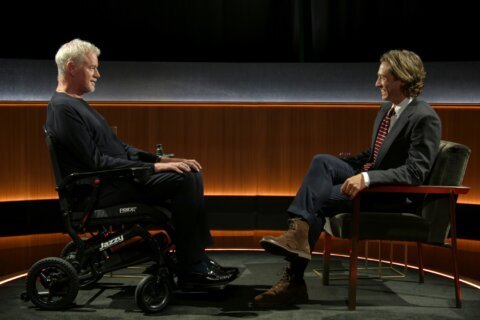Hear our full conversation on my podcast “Beyond the Fame.”
He won the International Bluegrass Music Association’s Entertainer of the Year nine times.
This Thursday to Sunday, Del McCoury brings the 14th Delfest to the Allegany County Fairgrounds in Cumberland, Maryland, for the first time since 2019, due to the pandemic.
“We missed two complete years,” McCoury told WTOP. “On March 9, 2020, I played the Grand Ole Opry. … It was a Tuesday night, we heard there could be a pandemic and, boy, that week, everything shut down, my manager, my booking agent … and the venues canceled shows. We didn’t do anything until that fall where they could put people in pods.”
This year’s lineup includes Del McCoury Band, The Travelin’ McCourys, Tyler Childers, Railroad Earth, Sam Bush, Robert Earl Keen, Molly Tuttle & Golden Highway and others.
“I played the first bluegrass festival there ever was in Fincastle, Virginia in 1966,” McCoury said. “[My manager] said, ‘Why don’t you start a festival? … Let me call this guy, he’s got this festival in Northern California.’ … He flew into Baltimore to look at some places. The first place we went to was Cumberland. … I said, ‘You won’t find a prettier location.'”
Born in 1939, McCoury grew up in York County, Pennsylvania whereas a teenager his brother brought home a record of Flatt & Scruggs’ “Roll in My Sweet Baby’s Arms.”
“When I was going to high school, the kids were listening to Elvis Presley, but I had already heard Earl Scruggs and he ruined me in a good way,” McCoury said. “I thought, ‘Man, whatever this guy’s doing, I want to try to do!’ When I heard that banjo, it was fast, that forward roll, it just grabbed me and didn’t let me go. … I was hearing the best.”
So, after learning guitar at age 9, he quickly shifted to banjo at age 11. About a decade later, in 1963, he was invited to join the very band that Flatt & Scruggs had recently left, Bill Monroe’s Blue Grass Boys, playing with the Father of Bluegrass himself, Bill Monroe.
“I was playing in Baltimore with a guy, Jack Cooke, who was an ex-Bluegrass Boy,” McCoury said. “I went in there one night, he found out I was a banjo player … and hired me on the spot. Later on, Bill Monroe came through town because he needed Jack to go with him to New York. … Jack said, ‘Did you bring a banjo player? We’ll just take Del.'”
Monroe soon promoted McCoury from banjo to guitar and eventually lead singer.
“It was baptism by fire,” McCoury said. “The first lick I ever played with the man was out on stage. I didn’t go out on a limb playing nothing. I stuck to the basics, but he liked what I did and offered me a job that night. … When I went down to Nashville, he still had not hired a lead singer and guitar player, and he wanted me to do that instead of playing banjo.”
McCoury briefly left for California to join the Golden State Boys before coming back east.
“I took a job with them, but I wasn’t really satisfied until I came back east, back to PA, and when I got my own band, I started playing guitar,” McCoury said. “I decided I would be better off playing the rhythm in the band, because rhythm guitar is really important in bluegrass. … I mostly played in York County, but mostly in Baltimore, sometimes in D.C.”
He says Baltimore has a long, underrated history of bluegrass music.
“The first bluegrass band that played Carnegie Hall was playing a little bar in Baltimore,” McCoury said. “Before Bill Monroe or Flatt & Scruggs or anybody, Alan Lomax was a folklorist, he came down to Baltimore, got this band, took them up [to New York City] and they put them on a record. … It was Earl Taylor & The Stoney Mountain Boys.”
He also says D.C. has bluegrass history with Buzz Busby & The Bayou Boys.
“He was big around there,” McCoury said. “Buzz Busby moved up to D.C. from Louisiana and he brought this guitar player with him named Charlie Waller. They’d been playing … the Louisiana Hayride in Shreveport. He told me, ‘I had a poster in the trunk of my car that said, ‘Appearing tonight Buzz Busby & The Bayou Boys featuring Elvis Presley.'”
Tragically, Busby had a car accident after playing a bar in Tysons, Virginia.
“He was really hurt bad,” McCoury said. “Charlie Waller thought, ‘Well, I’ll get this boy [John Duffey] who plays mandolin and we’ll keep playing until Buzz gets better.’ … Buzz never came back. … They renamed this band The Country Gentlemen. … The Seldom Scene sprang from The Country Gentlemen [and] they played Georgetown.”
All the while, the Del McCoury Band has been chugging along since 1967, for a while featuring his brother Jerry on bass and adding son Ronnie on mandolin in the 1980s.
“When I got my own band, I was in my ’30s, my boys were just little guys, it never dawned on me that those kids would play music,” McCoury said. “As time went on, the mandolin player quit, and Ronnie was only 14. … His principal said, ‘Ronald tells me you’re going on tour [in Europe]. … I think he’ll learn more over there in that month than he will here.'”
A few years later, he added his other son Robbie on the banjo.
“My brother … quit me and went with Don Reno in D.C., he heard my brother on bass and hired him right out from under me!” McCoury said. “I told Rob, who was playing banjo from the time he was 9 to this point in time out of high school, I told Rob, ‘You’re gonna have to play bass.’ … Then my banjo player quit and I said, ‘I want you to play banjo.'”
In the 21st century, McCoury earned two Grammys for Best Bluegrass Album for “The Company We Keep” (2003) and “The Streets of Baltimore” (2014). Still, his favorite career achievement was Patty Loveless inducting him into the Grand Ole Opry in 2003, which he heard about during the International Bluegrass Music Association Awards in Kentucky.
“I was up at the podium, two guys walked up … and it was Ricky Skaggs and Sonny Osborne,” McCoury said. “Sonny said, ‘Del, where were you at 40 years ago tonight? … You were on the Grand Ole Opry singing with Bill Monroe. Ricky Skaggs and I wonder if you would like to join the Grand Ole Opry?’ … It was the most exciting thing in my career.”
Hear our full conversation on my podcast “Beyond the Fame.”








